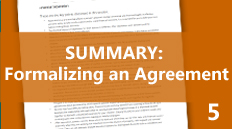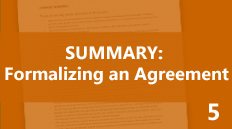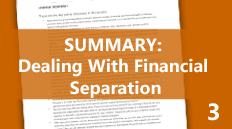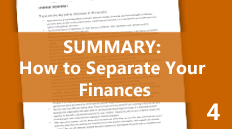Formalizing the Separation
These are the key points discussed in this section.
| * | Separating parents can formalize financial issues in a written agreement or court order. |
| * | The rules around how your financial issues can be resolved will come from family law legislation which includes the BC Family Law Act and the Canadian Divorce Act. |
| * | The FLA is a child centered law that focuses on the best interests of the child when parents separate so financial decisions made by the court will use this test. |
| * | Both parents are responsible for making sure there is money to raise their children after separation. Parents also have the responsibility of being guardians to their children which includes daily care and supervision and making decisions about education, housing and religion. |
| * | Parents can decide how these responsibilities are going to be split or shared and about how they each spend time with their children. |
| * | The FLA encourages parents to find solutions outside of court which may be easier and less expensive. Negotiation, mediation, arbitration and collaborative law can be used to resolve the issues. |
| * | The FLA also defines family violence and courts can issue protection orders to protect people who are at risk of family violence. |
| * | Written agreements often called separation agreements can formalize support, parenting arrangements and property division. |
| * | Written agreements enable parents to put in what they want to have happen after separation. Consideration should be given to the Child Support Guidelines amounts so that the agreement can be filed with the court if necessary. |
| * | You both need to sign the agreement and it is advisable to get separate legal advice before you sign. |
| * | No requirement to file a written agreement with the court unless you want to make changes which you cannot agree about or you want to use the Family Maintenance Enforcement Program. However, only some parts may be legally enforceable if not filed. |
| * | You can go to court to have your agreement changed or cancelled or you can go to a mediator or lawyer to help you make the changes. |
| * | There are different orders a court can make. A consent order is like a written agreement but a judge usually reviews it, either in person or as a desk order. Parties can use a consent order when they agree to change and existing court order. A consent order is legally enforceable. |
| * | When parties cannot agree on the amount of support either party may ask the court to decide the matter for them. The Child Support Guidelines must be considered by the judge and usually in BC the courts also consider the Spousal Support Advisory Guidelines before making a support order. |
| * | Protection orders to protect one family member from another can be made and will be enforced under the Criminal Code of Canada so the abuser can be charged with a criminal offence if he or she does not obey the order. The order is in force for one year unless otherwise stated. |
| * | Conduct orders are made to encourage settlement in order to move the case through the courts in a timely manner. |
| * | Courts can also prohibit a party who is misusing the court process from making further applications without permission and may require that person to pay a fine or the other person’s expenses. |
| * | Court orders made under the former Family Relations Act will stay in place. |
| * | Court orders may only be changed by another order, not by agreement. |
| * | An order made in Supreme Court can only be changed or cancelled in Supreme Court. |
| * | An order made in Provincial Court can be changed or cancelled by a subsequent order of the Provincial Court or by an order made in Supreme Court. |
| * | Provincial court orders can be appealed to Supreme Court. |
| * | Both courts can enforce orders within their jurisdictions. |
| * | Judges can take steps if a person is not following a court order for parenting time and contact. |
| * | A judge can impose extreme measures on someone who will not obey a court order. It may result in the person paying a fine to the court, paying the expenses of the other party or going to jail. |
| * | A standard child support order must include the following elements: |
| - -The names of the payor, the person paying support and recipient, the person receiving support; | |
| - -The Guideline income of the payor; | |
| - -The names and birthdates of each child covered in the agreement; | |
| - -The amount of support; | |
| - -The effective start date for support payments; | |
| - -The frequency of payments; | |
| - -The date of the month the payment is due; and | |
| - -The duration of the agreement. | |
| * | Agreements or orders that address child support and spousal support generally refer to ongoing financial responsibilities. It is important that each parent has in their possession, and understands the details of, any and all agreements or orders that address support. |










